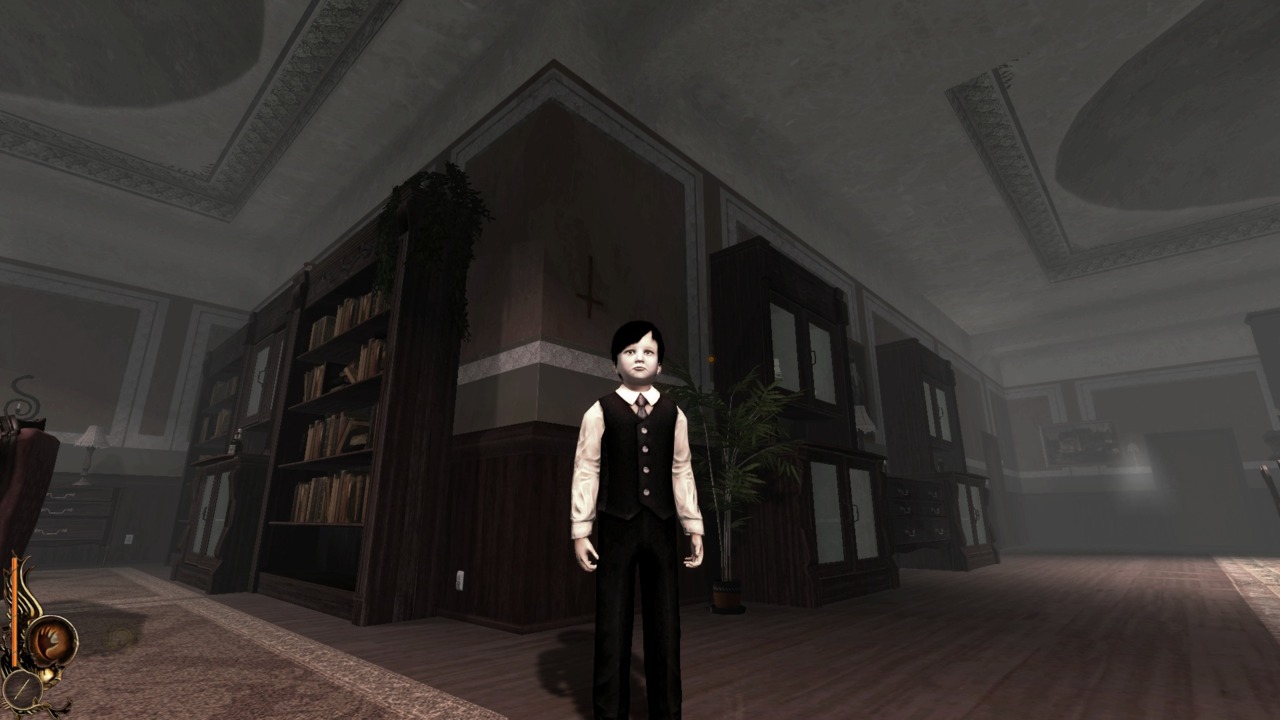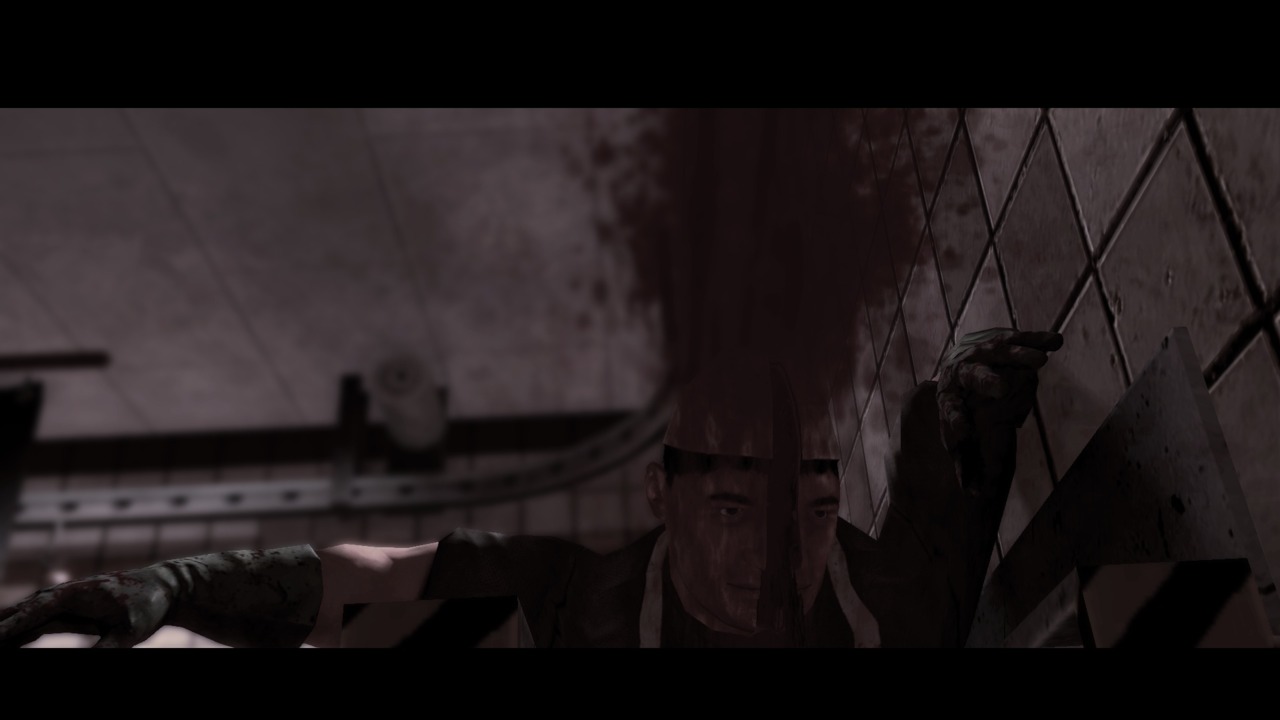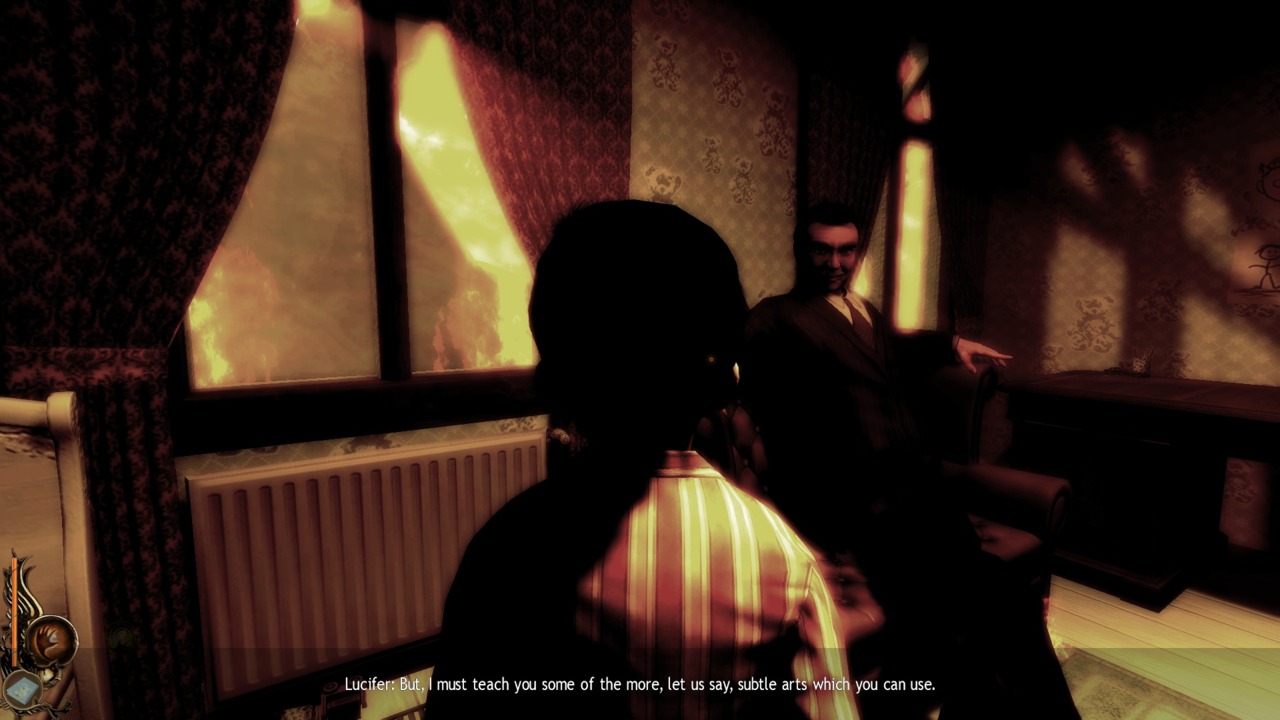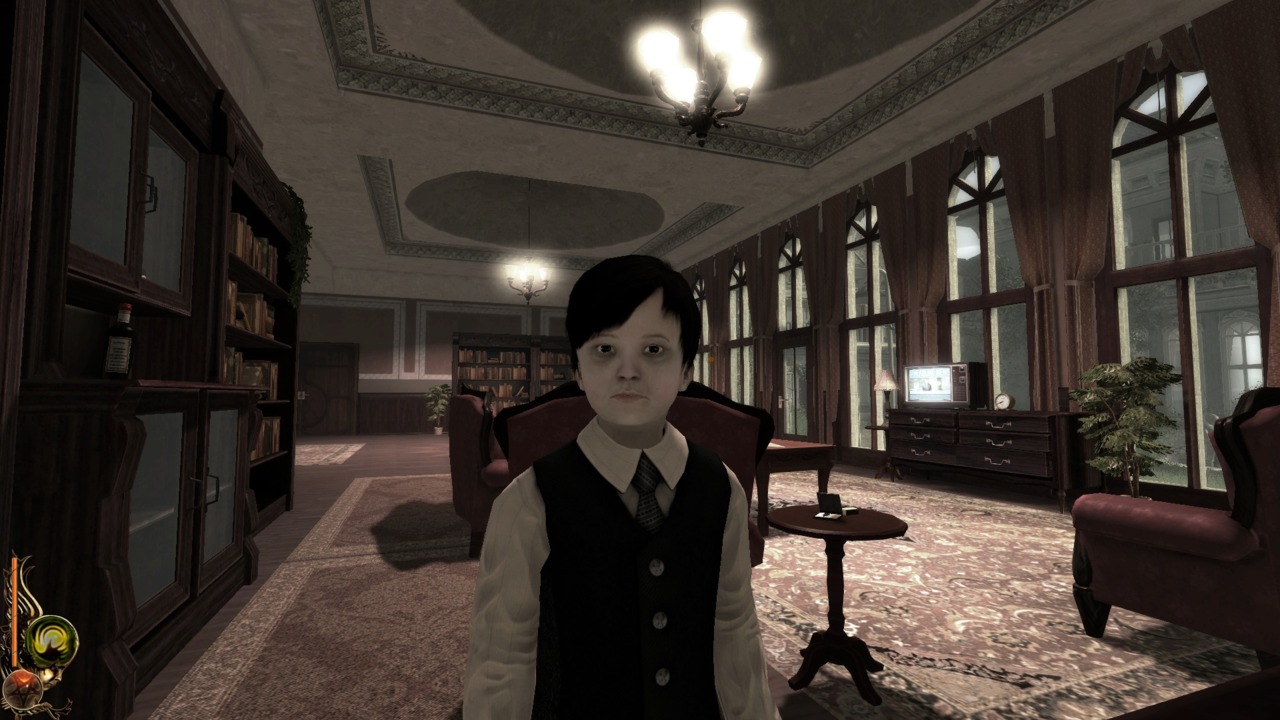It ain't easy being the Antichrist. In adventure/puzzle game Lucius, you experience the trials and tribulations of being the firstborn son of the big red guy with the horns. As you might expect given the young lad's pedigree, when he suffers growing pains, they involve a sizable body count. Lucifer is a demanding daddy, who wants souls in exchange for building the tyke up with telekinetic powers. All this contributes to a grim but promising setting where your only goal is to figure out how to murder the folks on the devil's hit list. Unfortunately, this darkly innovative premise is not implemented well, due to a reliance on pixel hunts, and you're dropped onto the scene with just pop's orders to start killing.

The entire game has been liberally borrowed from the Omen series of horror films (so liberally that you wonder if lawyers are being put on retainer at this very moment). You take on the role of the title character, Lucius, who gets a visit from his infernal real father on the occasion of his sixth birthday on June 6, 1972 (which, of course, means that he was born on the auspicious date of 6/6/66). Daddy stops in to give the pale-faced, lank-haired little ghoul both gifts and marching orders. He has big plans for Lucius, and these can best be realized by the murder of, well, pretty much everybody who lives and works in the huge family home called Dante Manor.
You start off by simply locking a maid in the walk-in kitchen freezer, and then graduate to inventive slaughters such as cutting a butcher's head in half. If you're familiar at all with the decapitations and vivisections that made the first two Omen movies so striking back in the '70s, you'll know exactly what sort of Grand Guignol atmosphere that developer Shiver Games is going for here. Most of the game is creepy and understated, with Lucius haunting the halls of the old mansion, sometimes with just a flashlight to guide his way. A barely there B-movie script and mechanical voice acting make it tough to take the story seriously, but the kills make a real impression as they splash onto the screen with showers of blood and body parts. The game strikes a good balance between chills and gore that any fan of horror movies will appreciate.
It's not as if Lucius is just an average, everyday six-year-old serial killer, either. He possesses a range of supernatural powers courtesy of dear old dad. These get more powerful with every murder, so while you start with the basic telekinetic ability to toss around objects and turn on machinery (bad luck for that butcher mentioned above), you are soon enough launching fireballs. At the same time, Lucius is just a kid to his parents and the household staff. You might be plotting gruesome murders, but you still have to brush your teeth and clean up your room so mommy and daddy can see that you're a good boy (the one bit of effective black comedy in a game that is otherwise gloomy). Rewards for being so well behaved include such treats as a Ouija board that dispenses hints, though it's not clear how mom and dad got their hands on such trinkets.

Aspects of the gameplay are more off-kilter in reality than they seem when laid out on paper. The biggest problem is a lack of information. You're essentially greeted with the devil's instructions to start killing people right when the game begins, and are left to suss out how to go about doing this on your own. Tips are given about various special skills, like telekinesis, but the core aspects of the game are not explained well. And they really should be, because this is a unique experience that blends the murder-sim attitude of games like Hitman and Manhunt with point-and-click adventure tropes. Lucius can't just creep up on his kills. Instead, he needs to explore the mansion to load up his inventory with various items necessary to set victims up and finish them off. Lucius also has to sneak around. Getting spotted doing something odd by mom or any of the other characters that patrol the mansion results in instantly failing your assignment. This process makes sense when clearly laid out, but unfortunately, the developers didn't include tutorial killings to help you get a clear picture of your task.
As the old saying goes, the devil is in the details, and details abound in Lucius. Dante Mansion is a massive old place loaded with exhaustively detailed dens, living rooms, bedrooms, bathrooms, game rooms, bars, gardens, cellars, kitchens, and more. The sheer amount of care that went into the mansion's design is impressive. Pretty much everything is functional. You can pull open drawers in every desk, nightstand, and wardrobe in the place, and a lot of rooms come equipped with crucifixes that need to be flipped upside down before they drain Lucius of his Hades-spawned powers.

It all looks good, even though the visual quality is more functional than cutting-edge and the repetitive music can add a grating tone to the entire scene. Alas, there are some high costs to this visual appeal. First of all, loading the mansion takes am exhaustingly long time. Second, the cavernous nature of the home makes for tedious exploration and pixel hunting when looking for items required to pull off a kill. Feedback is often lacking. Certain puzzles lack proper clues pointing you towards the proper solution, such as overheard lines of dialogue that could nudge you in the right direction. Formidable leaps in logic have to be made all through your killing spree, making you wonder if the devil might have been better off giving Lucius a .38 and an alibi.
Also, though the mansion is enormous and absolutely loaded with all manner of furniture and people, there seems to be only one road to every murder. There is no way to freewheel through killings, or to concoct various nefarious plots. The sprawling setting is mostly wasted, because you can't make use of it to pull off inventive murders. Instead, you're stuck with a paint-by-numbers approach where you follow a set path of collecting items and triggering events that then kick off a brief cutscene of someone dying in a macabre fashion. This limits the game, especially if you come to it as a veteran of something like Manhunt, where you could murder victims in all sorts of creative ways.
Lucius blends frustration with aha moments where everything briefly comes together. While you take some morbid pleasure in walking around in the cloven hooves of a chip off the old Beelzebub, it is hard to fully enjoy figuring out how to send your victims on their merry way to hell. Playing a gaming adaptation of The Omen from the perspective of the creepy little kid is certainly an original concept that will carry you along for a while, but the underdeveloped and limited mechanics make it tough to see this horror story through to its conclusion.
